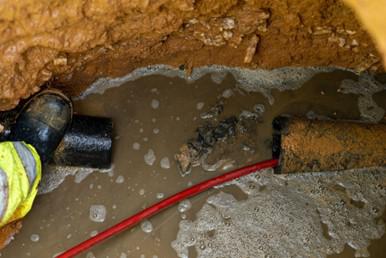
Sewer backups are serious and need to be addressed right away. They pose serious health threats and can significantly damage your home.
If you know what to look for, you can address a sewer backup before it becomes serious. When it comes to a sewer back up, it’s always better to address the problem sooner rather than later. Let's take a look at five common ways that backups can happen in sewer lines.
Blockages
Blockages are among the most common causes of sewer backups. When paper towels, toilet paper, grease, and other things that don't belong down the drain build-up in sewer pipes, they can create clogged pipes that obstruct the flow of sewage.
Over time, these blockages can cause a sewage backup, which lead to raw sewage pooling in basements or floor drains. You can prevent blockages by avoiding pouring grease down the drain and being mindful of what they flush. A sewer line cleanout can help keep the sewer system running smoothly and prevent sanitary sewer backups.
Pipe Damage
Damaged sewer pipes are another cause of sewer backups. Sewer line cracks or broken pipes can result from shifting soil, heavy traffic overhead, or aging infrastructure. When cracked sewer pipes occur, they allow sewage to escape into the surrounding soil, which can lead to a sewage backup inside homes.
The structural integrity of old sewer lines — particularly those made from clay pipes or cast iron — deteriorates over time, making them susceptible to breaks. Addressing these issues promptly can prevent extensive damage and ensure the sewer lines function properly.
Invasive Tree Roots
Tree roots are another leading cause of sewer backups. Small roots seeking out moisture and nutrients can infiltrate sewer pipes through small cracks or service pipe joints. Once inside, the roots can expand and cause severe blockages that can damage sewer pipes.
Homeowners should take preventive measures to avoid tree roots from invading their sewer lines by choosing appropriate landscaping and scheduling regular inspections. By using modern materials like PVC piping, you can also reduce the risk of tree root intrusion and maintain the health of your sewer system.
Excessive Rainfall
Excessive rainfall can overwhelm both private sewer systems and municipal sewer systems, leading to backups. When heavy rain falls, the excess water can infiltrate the sewer system and cause it to exceed its capacity.
This situation can cause a sewer backup in homes, particularly if the main sewer line cannot handle the increased flow. Installing sump pumps and ensuring proper drainage around the property can help mitigate the risks of basement flooding and raw sewage backups. Additionally, homeowners should check for illegal plumbing connections that might contribute to the problem.
Old Age
Aging sewage systems are prone to sewer backups due to the deterioration of materials over time. Old sewer lines — especially those made from clay pipes or cast iron — become more susceptible to cracks, leaks, and blockages.
These issues are compounded in homes with older infrastructure, leading to increased chances of a sewage backup. Regular inspections and upgrades to the sewer system can help mitigate the risks associated with aging pipes. Knowing the signs of wear and tear lets you be proactive and take steps to maintain your home's sewer system.
If You Ever Need Sewer Line Repair, Reach Out to Ben Franklin Plumbing
At Benjamin Franklin Plumbing, we offer professional sewer line repair services to those in need. Additionally, if your sewer line is too old and on its way out, we also offer sewer line replacements and installations. Get in touch with our team (215) 515-0918 today to learn more about our services and to schedule one for your home.

 Your Privacy Choices
Your Privacy Choices